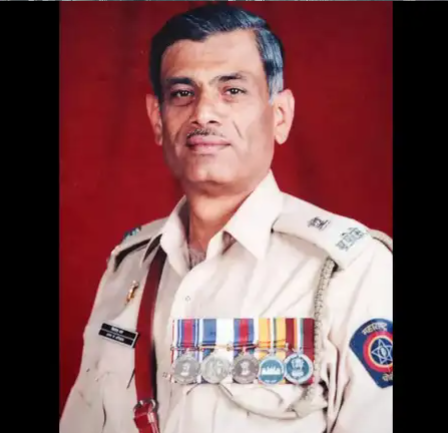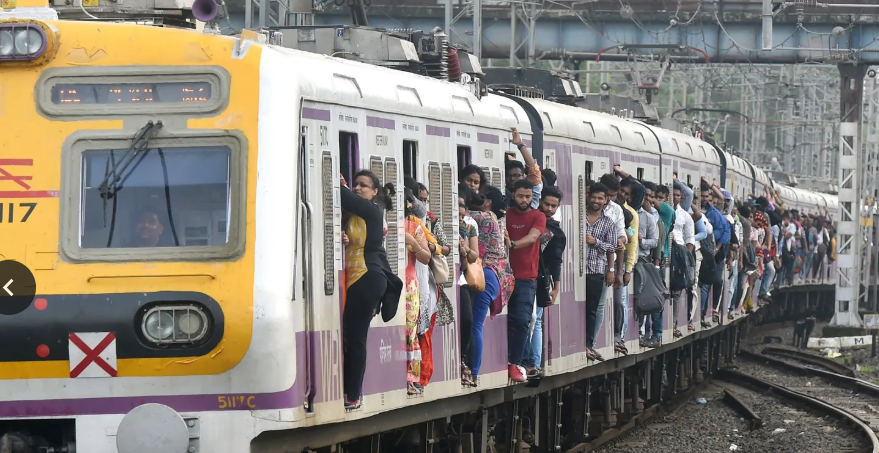Nineteen years after an assistant commissioner of police, investigating the 2006 Mumbai blasts, allegedly committed suicide by throwing himself before a train, serious questions have arisen regarding the circumstances that led to his death. Discussions on whether the shocking acquittal of all 12 accused in the case is connected to the ACP’s death, with the Bombay HC passing scathing comments on the shoddy investigation and chargesheet filed in the case, are also getting louder.
Assistant Commissioner of Police (ACP) Vinod Bhat, a key investigating officer in the 2006 Mumbai train blasts case, died under mysterious circumstances in August 2006, shortly after the blasts. ACP Vinod was found dead on the railway tracks between Dadar and Matunga stations in Mumbai. While initial reports from the Dadar railway police registered it as an accidental death, sources within the city police and later reports suggested it was a case of suicide. He was allegedly run over by a local train.
Bhat was known as an upright officer and had been transferred to the Anti-Terrorism Squad (ATS) to lead the 7/11 blast investigation. Back then, some reports and statements from individuals, including Abdul Wahid Shaikh (one of the acquitted accused), have alleged that Bhat was under immense pressure from his superiors to falsely implicate innocent individuals in the case. Shaikh, in his book and public statements, claimed that Bhat committed suicide because he could not bear the pressure to frame innocent persons on the same railway track where the bomb blasts had occurred.
Former ATS chief K.P. Raghuvanshi, however, denied claims that ACP Vinod Bhat was being pressured to act illegally. Despite these denials, the mystery surrounding Bhat’s death has persisted, and with the acquittal of all 12 accused citing lack of credible witnesses and solid evidence, the case has resurfaced to haunt the Mumbai police.
Details of the Verdict
Earlier this week, the Bombay High Court acquitted all 12 accused who had been previously convicted by a special MCOCA court in 2015. Five of these individuals had been sentenced to death, and seven to life imprisonment. The High Court’s decision came after nearly 19 years since the tragic incident, during which the accused remained incarcerated.
The High Court, in its judgment, delivered a scathing indictment of the Mumbai Police’s Anti-Terrorism Squad (ATS), remarking that it had created “a false appearance of having solved a case by presenting that the accused have been brought to justice gives a misleading sense of resolution.” The court held that the prosecution failed to establish the guilt of the accused and severely criticized the investigation for its lack of credible evidence.
The 2006 Mumbai train bombings were a series of seven coordinated bomb blasts that occurred on July 11, 2006. These explosions took place over a period of just 11 minutes on the Suburban Railway in Mumbai, the bustling capital of the Indian state of Maharashtra. The bombs were ingeniously concealed within pressure cookers and placed on trains operating on the Western Line Suburban Section of the Mumbai Division of Western Railway.
The attacks, which occurred during the evening rush hour, resulted in a devastating loss of life, killing 209 people and injuring over 700 more. The first blast was reported at 18:24 IST (12:54 UTC), with subsequent explosions continuing until 18:35. The targeted trains were in the first-class “general” compartments, and the blasts affected several stations, including Churchgate, Matunga Road, Mahim Junction, Bandra, Khar Road, Jogeshwari, Bhayandar, and Borivali.

Why Were All the Accused Acquitted in the Case?
The Bombay High Court’s decision to acquit all 12 accused was primarily based on the prosecution’s failure to prove their guilt beyond a reasonable doubt. The High Court identified several critical flaws in the investigation conducted by the Maharashtra Anti-Terrorism Squad (ATS):
Unreliable Confessional Statements: The court found that the confessional statements of the accused were “not truthful or complete” and inadmissible. It noted variations in correspondence before and after recording confessions and the absence of mandated certificates to establish voluntariness. Medical evidence from KEM Hospital and Bhabha Hospital also “sufficiently hinted at the possibility of torture” inflicted on the accused to extract confessions.
Untrustworthy Witness Testimonies: The court scrutinized the evidence of eight witnesses, including taxi drivers and those who claimed to have seen the accused planting bombs or assembling them. It noted significant delays (over 100 days) in taxi drivers reporting their statements and a lack of special reasons for them to remember the accused after such a long gap. Witnesses to bomb planting also had long gaps in their memory. One witness to bomb assembly changed his version during cross-examination, leading the court to deem his evidence unreliable. A witness to the conspiracy was unaware of the subjects discussed, and a witness who helped draw sketches was not called for trial.
Flawed Evidence Handling: The court found issues with the evidentiary value of recovered explosives (RDX granules, detonators, cookers, circuit boards) due to the prosecution’s failure to establish proper custody and sealing until the articles reached the Forensic Science Laboratory (FSL). Circuit boards recovered were also deemed unhelpful as the prosecution failed to establish the type of bombs used.
In essence, the High Court concluded that the ATS’s case relied heavily on evidence that was either unreliable, improperly handled, or obtained under duress, leading to the acquittal of all accused.
Anti-Terror-Squad Officials Who Filed Chargesheet
The investigation into the 2006 Mumbai train blasts was primarily conducted by the Maharashtra Anti-Terrorism Squad (ATS) of the state police. The Bombay High Court’s recent verdict heavily criticized the ATS for its investigation methods.
Key ATS officials include KP Raghuvanshi, ATS Chief at the time of the investigation and Vinod Bhat, assistant commissioner of police, whose alleged suicide has been a point of discussion, with some suggesting pressure during the probe.
The ATS chargesheet, filed on November 30, 2006, implicated 30 individuals, including 13 Pakistani nationals who are currently absconding. The ATS had initially attributed responsibility for the blasts to the banned Students’ Islamic Movement of India (SIMI).
Suspects and Their Background
The 12 individuals acquitted by the Bombay High Court had spent nearly two decades in prison following their conviction by a special MCOCA court in 2015. Five of them had been sentenced to death, and seven to life imprisonment. One of the accused, Kamal Ahmed Mohammad Vakil Ansari, unfortunately, died in custody in 2021 due to COVID-19, but was also acquitted posthumously.
Some of the other accused include Mohammed Faisal Attaur Rahman Shaikh, Ehtesham Qutbuddin Siddiqui, Naveed Hussain Khan, Asif Khan, Tanveer Ahmed Mohammed Ibrahim, Ansari, Mohammed Majid Mohammed Shafi, Shaikh Mohammed Ali Alam Shaikh, Mohammed Sajid Margub Ansari, Muzammil Ataur Rahman Shaikh, and Suhail Mehmood.
Abdul Wahid Shaikh is a notable figure among the accused as he was the only one acquitted by the trial court in 2015, even before the recent High Court verdict. A schoolteacher by profession, Shaikh had spent nine years in prison. He has been a vocal critic of the ATS investigation, alleging torture and wrongful implication of the accused. He has since become an advocate for those wrongfully incarcerated.
The ATS chargesheet had claimed that the accused were part of a larger conspiracy involving the banned Students’ Islamic Movement of India (SIMI) and, in some conflicting reports, Lashkar-e-Taiba (LeT). The High Court’s acquittal, however, casts serious doubt on these initial claims due to the lack of conclusive evidence.
Victims’ reactions
The Bombay High Court’s verdict, and the subsequent stay by the Supreme Court, has evoked strong emotions among the victims and their families, who have endured nearly two decades of legal battles and emotional trauma. For many, the acquittal has reopened old wounds and raised profound questions about justice.
Ramesh Naik, who tragically lost his daughter in the blasts, expressed his deep frustration and disbelief. He questioned the prolonged legal process and the outcome, stating, “I had a question for the government: why did it take 19 years? 19 years for what purpose? What was the matter that caused it to take 19 years before reaching a decision? After a bomb blast happened in 2002, another incident occurred in 2008, and for that, Kasab and others were hanged quickly. However, these terrorists, who were kept in jail for 19 years, have now been acquitted. If not them, then who caused the bomb blast on the train? It seems like a joke; the court’s decision appears to be a joke.”
Another victim, who lost a hand in the explosion, conveyed the profound impact of the High Court’s decision, saying, “I lost one of my hands in the explosion on July 11, 2006. But what shook me more was the High Court’s decision to acquit all 12 accused. That was a bigger blow than losing my hand.”
Several victims have gone on record claiming that they were unsure of the direction in which the investigation was progressing after the death of ACP Vinod Bhat, which was dismissed as a train mishap unconnected with the investigation.
Meanwhile, the Supreme Court’s decision to stay the High Court’s acquittal has been met with a glimmer of hope by some victims, who see it as a potential step towards re-evaluating the case and ensuring that justice is ultimately served. However, the prolonged uncertainty and the recent turn of events have left many feeling a deep sense of betrayal and a questioning of the judicial system’s ability to deliver timely and conclusive justice.



